It’s a shame that Behind the Candelabra didn’t receive a theatrical release in the United States. It’s a shame for a lot of reasons. For one thing, it’s a shame that the studios think so little of American audiences that they’d refuse a relatively meagre $5m budget for a Liberace biopic which was “too gay.” It’s a shame that Steven Soderbergh’s last film will not be shown in American cinemas, given his recent discussions about the state of the medium. It’s a shame that none of the talented people involved in the film (from Michael Douglas through to make-up artists Todd Kleitsch and Christine Beveridge) will never garner the awards attention they so sorely deserve.
It’s also a shame because Behind the Candelabra is just a damn fine piece of cinema, and one which deserves a little time on the big screen.
Then again, Liberace is a touchy subject. At a performance early in the film, Liberace is joined on stage by his protégé, clad in attire matching that of the stage icon. Bob Black deadpans, “A pair of queens!” An elderly woman sitting ahead of him turns her head to shoot him a disparaging look. Scott Thorson wonders about the audience which has turned out to hear the icon play. Bob leans in and whispers, “They have no idea he’s gay.”
Visiting the Liberace museum a few years back, Donald Clarke recalls a similar experience, with some tourists offended at any suggestion that their idol’s sexual orientation might not conform to all those white lies he and manager Seymour Heller used to spread to help keep his private life private. “People will say anything these days,” Clarke recalls hearing the fans moan at one point on the tour, clearly unable to accept that Liberace could be anything other than what they imagined him to be.
It’s a mistake which Behind the Candelabra rather shrewdly avoids. It doesn’t rush to judge any of its characters, and invites the viewers to reach their own conclusions about the leads. It embraces Liberace as the bold conundrum that he was. The wholesome all-American icon with his own wants and needs, the ageing star unsure about how to express his affection for the young man he took under his wing, emotionally dependant and possibly predatory, devoutly Christian and undeniably gay.
It’s a bit of a cliché to suggest that Behind the Candelabra is a story which needs no embellishment, but it’s a story inhabited with larger-than life characters and incidents which are so outrageous that they could only possibly be true. Characters flirt at the edge of the picture with their own outrageous stories to tell.
Consider the plastic surgeon Jack Startz played by Rob Lowe, who seems like a twisted celebrity doctor from one of those super market tabloids brought to life, complete with permanently intrigued facial expression. His work on Liberace is so half-baked that it leaves the celebrity unable to close his eyes, and he spends a portion of the film acting as a drug dealer to Liberace’s lover/surrogate son, Scott. None of this is exaggeration. The real-life Startz could easily anchor his own film, complete with spectacular fall from grace. However, in the midst of Behind the Candelabra, he’s just a glorified bit player.
Behind the Candelabra is absurd, but only because it reflects reality. There’s something profoundly creepy about the relationship between Liberace and Scott Thorson. They are lovers, but Liberace also plans to adopt him at one point. He also has Scott undergo extensive plastic surgery so that Liberace can build a younger model of himself. It’s profoundly unsettling, and it’s very hard to figure out what dynamic Liberace wanted from Scott, let alone what actually existed. Asked to explain the relationship, all Scott can offer is, “It’s really… very hard to explain.”
There’s the potential for the story to become a bit one-sided. After all, the source for a lot of these grand claims is Scott Thorson himself, and there’s no other source to potentially off-set any bias that Thorson might have. At the same time, Soderbergh is both sympathetic and wary of both leading characters. We’re never quite sure what Liberace expects from Scott (in fact, we don’t know that he knew what he wanted), but there’s also some uncertainty about what Scott wanted in return.
It’s a confusing labyrinth of human interactions and betrayals, and one that Soderbergh is smart enough not to reduce to a one-dimensional dynamic. Both characters are, by turns, selfish and vulnerable and honest and manipulative and passive-aggressive and exploitative and greedy and generous and affectionate and bitter and loving and hating. It’s a complex web of emotion, and Soberbergh manages it all very well.
It’s a nice reminder of exactly what we’ll miss about Soderbergh. I’ll concede that I wasn’t always in love with the director’s work, but he had a very clear knack for constructing a film. There are several wonderful shots here. At one point, for example, Soderbergh lets us know where Liberace’s attention is focused as he watches his opening act perform. At another, as Scott tries to straighten himself out, the camera bobs in time with Matt Damon’s nervous swaying, creating a suitably disorientating (but not overwhelming) effect.
The two leads do a great job. Douglas is completely exposed in the role of Liberace. There’s never a sense of modesty or restraint. The actor manages to convey the star’s outlandish personality and garish taste while still projecting a strange vulnerability. (It’s no coincidence that Liberace spends so much of the film naked, in stark contrast to his over-dressed stage persona; symbolism!) Douglas has the accent and mannerisms down well, but it’s the humanity he captures best of all.
Matt Damon is suitably effective as Scott Thorson. He’s graceful enough to allow Douglas to steal most of the show, but his work provides a solid underpinning to the movie. This is very much Scott’s story, as much as Liberace stands at the centre of it, and Damon isn’t afraid to add some complexity or ambiguity to the character. He invites the audience to reach their own conclusions about who Scott Thorson is and what he wanted from Liberace.
There’s a rake of superb supporting talent here, which Soderbergh seems to have mostly pulled from the “lost eighties actors” talent pool. Dan Ackroyd plays Liberace’s long-suffering manager. Scott Bakula is charming as Bob Black. Rob Lowe is delightfully sleazy as Startz, and it can’t have been easy to emote under that much make-up. It’s also nice that movie finds a small role for Paul Reiser, and Debbie Reynolds is suitably effective as Liberace’s imposing mother.
Behidn the Candelabra is a fascinating profile piece, one which realises that it’s enough to let the facts of the matter speak for themselves. Let the audience and history make of it what they will. Sometimes life is so garish and bizarre that there’s nothing mroe you can do.
The movie itself
Filed under: Non-Review Reviews | Tagged: Behind the Candelabra, Bob Black, Candelabra, film, Liberace, matt damon, Michael Douglas, Movie, non-review review, review, Rob Lowe, Scott, Scott Bakula, Scott Thorson, Seymour Heller, Steven Soderbergh, United States |















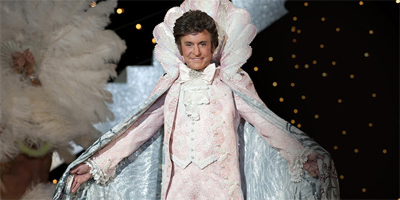
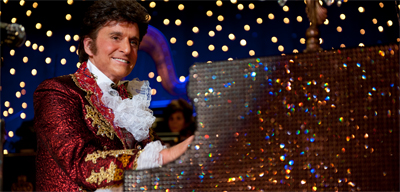
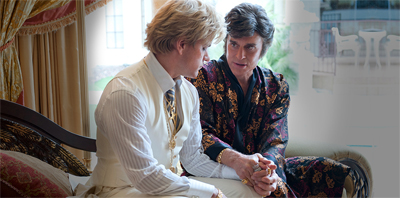
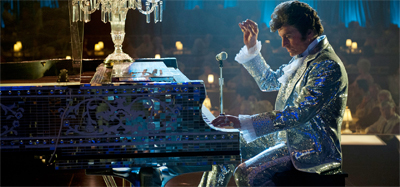
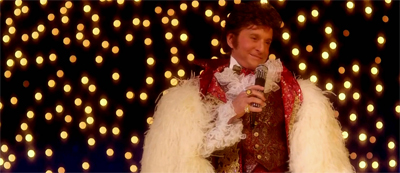
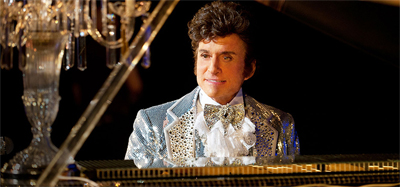
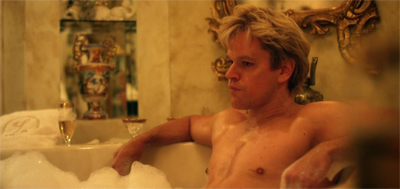





Leave a comment